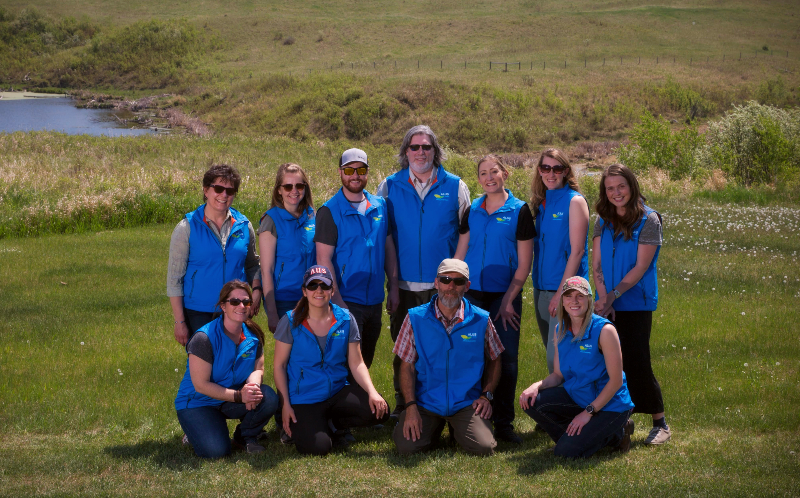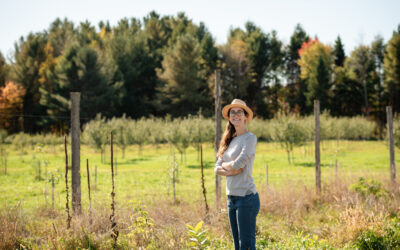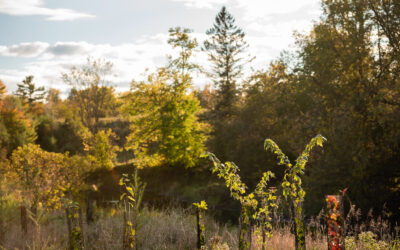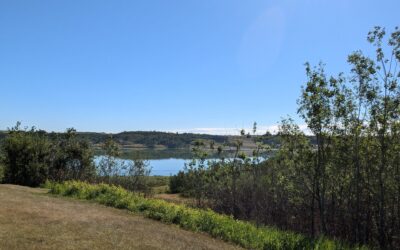ALUS Canada’s Western Hub to benefit from nearly $450,000 in new funding from the Canadian Agricultural Partnership in Alberta (Environmental Stewardship and Climate Change program).

A new grant from the Canadian Agricultural Partnership in Alberta will benefit all 13 ALUS communities in Alberta, shown here at the ALUS Canada Western Hub field conference in County of Vermilion River. (Photo: Kim Morritt, Dragon Hare Studios.)
PRESS RELEASE | Calgary, Alberta, March 25, 2020 | ALUS Canada announces nearly $450,000 in funding from the Canadian Agricultural Partnership in Alberta
ALUS Canada is thrilled to announce nearly $450,000 in new funding by the Environmental Stewardship and Climate Change program of the Canadian Agricultural Partnership in Alberta, a partnership between Agriculture and Agri-Food Canada and Alberta’s Ministry of Agriculture and Forestry.
The Partnership has granted ALUS Canada $447,240 for a new project, entitled “ALUS Program Innovation and Collaborative Learning in Alberta,” benefitting all 13 ALUS communities in Alberta.
“We support common sense environmental measures developed by ALUS. Local initiatives that improve our environment are the best kind of environmental policies,” said Alberta of Agriculture and Forestry Minister Devin Dreeshen.
This new federal-provincial funding will help strengthen the ALUS program across Alberta by improving program administration and database development while supporting networking, education and technical support provided to ALUS communities.
“We are so pleased to receive this funding from the Canadian Agricultural Partnership in Alberta,” said Christine Campbell, ALUS Canada’s Western Hub Manager. “Over the next two years, this grant will help ALUS Canada increase collaboration across Alberta, support our local municipal partners, and promote successes on the ground to encourage more farmers and ranchers to get involved.”
Canadian Agricultural Partnership funding is already helping to strengthen ALUS networks in Alberta by allowing ALUS Canada’s Western Lead, Rhonda King, to organize a number of important outreach activities and attend key meetings such as the 2020 Agricultural Service Board conference in Banff.
“I am proud of our stakeholders across Alberta for really pulling together,” said King. “There is definitely a growing synergy around ALUS in this province.”
Other face-to-face learning opportunities include the ALUS Canada Western Hub field conference in County of Vermilion River, the national ALUS field conference in Quebec, and PAC meetings in all 13 ALUS communities located across Alberta.
The grant will also allow ALUS Canada to provide greater technical support to ALUS communities in Alberta. ALUS is incorporating a new project-prioritization tool known as “BRIMS,” or “Bio-Resource Information Management System,” a province-wide collection of potential biomass resources, ecosystem services, and other land use characteristics. This service is currently being piloted in ALUS Parkland and ALUS Wetaskiwin-Leduc, where BRIMS training and technical support is being provided through Silvacom, enabling Program Coordinators and PACs to try this tool for assessing proposed ALUS projects in terms of their potential to increase ecosystem services for the community.
“Given the importance ALUS places on having a strong scientific basis for our program, it’s important to stay current with emerging, innovative technologies that can help us, and to provide support as ALUS communities adopt these new tools,” said Campbell.
The Canadian Agricultural Partnership in Alberta is also funding a number of communications materials to help ALUS Canada support the growth and delivery of the ALUS program in the West.
“Over the next year, look for a series of profiles showcasing ALUS participants in each of Alberta’s ALUS communities in Alberta, a series of fact sheets on the most common types of ALUS projects in Alberta, and a new national brochure highlighting western municipal accomplishments,” said Campbell. “There’s a lot to crow about in Alberta!”




